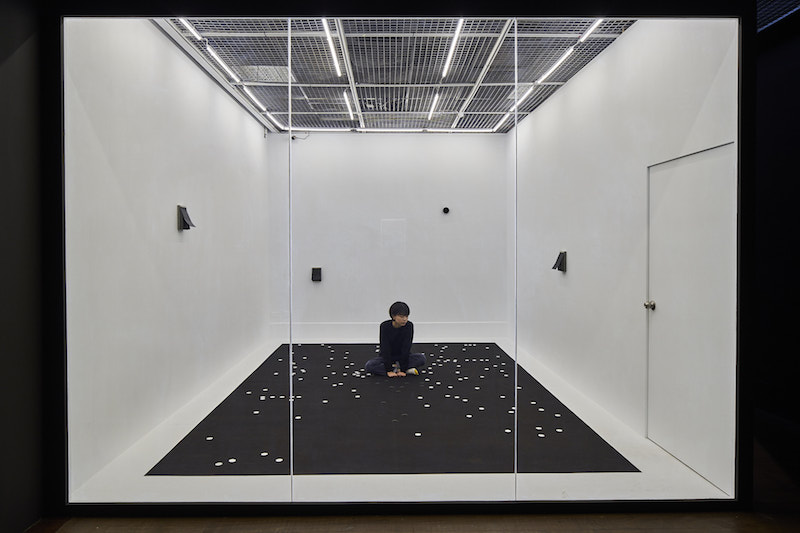
After All These Years,(Chao-Ming Teng)

The diagram for the carpet installation, denoting the positions of all the names of the “collaborators” appeared in the chronology of Rainy Night Flowers
Rainy Night Flowers, a song that was born
in 1934, was then one of the most popular songs in Taiwan. Since its release,
there have been more than 30 singers who have released the song, with a dozen
versions in different languages. Widely performed in political and memorial
campaigns, this song elicits nostalgia and a sense of collective identity in
Taiwanese people. “Rainy night flowers” has been used to describe Xie Xue-Hong (1901–1970),
who cofounded the Taiwanese Communist Party; it has also been used as a
metaphor for the tragic fatalism of Taiwan’s democracy, as well as for Taiwan’s
past economic development. This song has been banned by the government on
numerous occasions; it has also been featured in plays, films, and television
shows. The phenomenon of Rainy
Night Flowers has become the crux of extensive research in Taiwan.
Former Taiwanese president Lee Teng-Hui (1923–2020) had publicly expressed his
wish that Taiwanese people would stop singing this song. Rainy Night Flowers was the only Taiwanese song that
world-renowned tenor Plácido Domingo chose to perform in his 2002 concert in
Taiwan. Eighty-three years have passed before the song was designed as the key
clue to the mystery in Taiwanese survival horror video game Detention in 2017. A Taiwanese cinematic adaptation of Detention became an
instant blockbuster in 2019, where Rainy Night Flowers is featured as a crucial
music element that sets the tone of the film.
The
tenacious, unrelenting life of Rainy Night Flowers is transduced in Chao-Ming Teng’s hands into an unorthodox
interpretation. Suavely personified, the song in Teng’s eye seeks survival
after its inception, wangling its way to eternity through devious maneuvers of
the times and those who sang it. The artist has assembled written archives of
the song’s over 80 years of history into a chronology, printed out as flyers at
the exhibition for viewers to take. He has also penned a first-person narrative
of Rainy Night Flowers:
A voice-over of the song’s soliloquy is broadcast at the exhibition, where the
song looks back on the vicissitudes of its journey, as well as the lessons it
has learned. A conspicuous indication that an object is not merely dictated by
humanity, but it also defines humanity. This work proposes a question centered
on the personification of the song: an existence of multiple identities, ready
to be accessed at any given moment─does it count as a loss
of identity or a form of true proactiveness?
Just like Rainy Night Flowers, the work After All These Years, reinvents itself in every rendition. The way it is shown adapts to the exhibition space. In addition to the chronology and the voice-over, recurring motifs include the black rectangle that serves as the background of the chronology, as well as the number of mirrors that corresponds to the number of names in the chronology. The specifically proportioned black color block and the mirrors appear to be a means of Rainy Night Flowers to beguile you, or perhaps, the beginning of its secret machinations.
Chao-Ming Teng
Born and currently lives in Taipei. Teng graduated from the Media Arts and Sciences program from MIT School of Architecture and Planning. He had been invited to be the resident artist at Villa Arson (France, 2009) and Para Site (Hong Kong, 2014). Recently shows (selected) include Taipei Biennial (Taiwan, 2012), Dojima River Biennial (Japan, 2013), ALTERing-NATIVism—Sound Cultures in Post-War Taiwan (Taiwan, 2014), Discordant Harmony (Art Sonje Center, Korea, 2015), RR ZZ (Gluck 50, Italy, 2015), Hiroshima Trilogy: Part III (Hiroshima MOCA, Japan, 2015), Public Spirits (Warsaw CCA, Poland, 2016), Metahistory (TKG+ Gallery, Taiwan, 2018), Mercurial Boundaries (Museum of NTUE, Taiwan, 2019) and Rotating Exploded View Diagram of Historiography (Galerie Nichido, Taiwan, 2019).


